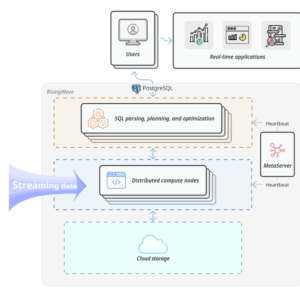

(wanpatsorn/Shutterstock)
Only the most advanced companies have overcome the technical complexity involved with processing streaming data in real time. One of the vendors aiming to reduce this complexity and make stream data processing available to the masses is RisingWave Labs, which today announced $36 million in financing.
The early days of stream data processing brought us stand-alone systems that were capable of acting upon vast streams of data, and doing so with low latency and reliability. Stream processing frameworks like Apache Storm made headway in addressing these challenges and led the way to more sophisticated frameworks like Apache Flink and others.
Things got significantly more complex when companies realized they needed to know something about the past to take the best action on the newest data, which necessitated the integration of stream processing frameworks with databases or data lakes, where the historical record lived as persisted data. Architectural blueprints, such as the Lambda and Kappa architectures, were proposed to address this unique challenge, but the technical complexity in keeping these dual-path systems running are immense.
Today we’re seeing the emergence of a new category of product–the streaming database–aimed at solving this problem. Instead of running data through a dedicated stream processing framework like Storm or Flink, the backers of streaming databases think that all the data processing–including the business end of a streaming big data pipeline like Kafka, Kinesis, or Pulsar–can be handled by the SQL query engine contained in a relational database.

RisingWave is a Postgres-compatible database developed to process data streams in the cloud (Image courtesy RisingWave Labs)
That’s the approach taken with RisingWave, a new open source streaming database that emerged just over a year ago. Yingjun Wu, a former AWS and IBM engineer, created RisingWave as a cloud-native database with the goal of providing the bernefits of stream processing without the technical complexity inherent with stream processing frameworks.
“Existing open-source systems are very costly to deploy, maintain, and use in the modern cloud environment,” Wu, who is the CEO of RisingWave Labs, says in a press release today. “Our goal is not to build yet another streaming system that is 10X faster than existing systems, but to deliver a simple and cost-effective system that allows everyone to benefit from stream processing.”
Developed in Rust, RisingWave is a Postgres-compatible database can do many of the things that stream processing frameworks do, but within the context and control of a familiar relational database running in the cloud and the SQL language, according to Wu, who has a PhD from National University of Singapore and was also a visiting PhD at Carnegie Mellon University.
“[RisingWave] consumes streaming data, performs continuous queries, and maintains results dynamically in the form of a materialized view,” Wu says in a blog post earlier this year. “Processing data streams inside a database is quite different from that inside a stream computation engine: streaming data are instantly ingested into data tables; queries over streaming and historical data are simply modeled as table joins; query results are directly maintained and updated inside the database, without pushing into a downstream system.”
The open source project, which available on GitHub via an Apache 2.0 license, is being adopted by organizations for a range of uses, including real-time analytics and alerting; IoT device tracking; monitoring user activity; and online application data serving. The company, which changed its name from Singularity Data three weeks ago, recently unveiled the beta of a hosted commercial version of RisingWave; it’s slated to become generally available next year.
The $36 million in Series A funding announced today brings the San Francisco company’s total funding to $40 million. That funding will help RisingWave tackle the real-time processing opportunities available in both legacy and green-field applications, says Yu Chen, a partner with Yunqi Partners, which was one of the venture firms that led the Series A.
“There is no lack of tools to process data streams,” Chen states in a press release, “but RisingWave is one of the few designed as a database and can be easily plugged into a modern data stack to make real-time data intelligence a reality.”
Related Items:
Is Real-Time Streaming Finally Taking Off?
Developing Kafka Data Pipelines Just Got Easier
Can Streaming Graphs Clean Up the Data Pipeline Mess?
April 25, 2025
- Denodo Supports Real-Time Data Integration for Hospital Sant Joan de Déu Barcelona
- Redwood Expands Automation Platform with Introduction of Redwood Insights
- Datatonic Announces Acquisition of Syntio to Expand Global Services and Delivery Capabilities
April 24, 2025
- Dataiku Expands Platform with Tools to Build, Govern, and Monitor AI Agents at Scale
- Indicium Launches IndiMesh to Streamline Enterprise AI and Data Systems
- StorONE and Phison Unveil Storage Platform Designed for LLM Training and AI Workflows
- Dataminr Raises $100M to Accelerate Global Push for Real-Time AI Intelligence
- Elastic Announces General Availability of Elastic Cloud Serverless on Google Cloud Marketplace
- CNCF Announces Schedule for OpenTelemetry Community Day
- Thoughtworks Signs Global Strategic Collaboration Agreement with AWS
April 23, 2025
- Metomic Introduces AI Data Protection Solution Amid Rising Concerns Over Sensitive Data Exposure in AI Tools
- Astronomer Unveils Apache Airflow 3 to Power AI and Real-Time Data Workflows
- CNCF Announces OpenObservabilityCon North America
- Domino Wins $16.5M DOD Award to Power Navy AI Infrastructure for Mine Detection
- Endor Labs Raises $93M to Expand AI-Powered AppSec Platform
- Ocient Announces Close of Series B Extension Financing to Accelerate Solutions for Complex Data and AI Workloads
April 22, 2025
- O’Reilly Launches AI Codecon, New Virtual Conference Series on the Future of AI-Enabled Development
- Qlik Powers Alpha Auto Group’s Global Growth with Automotive-Focused Analytics
- Docker Extends AI Momentum with MCP Tools Built for Developers
- John Snow Labs Unveils End-to-End HCC Coding Solution at Healthcare NLP Summit
- PayPal Feeds the DL Beast with Huge Vault of Fraud Data
- Will Model Context Protocol (MCP) Become the Standard for Agentic AI?
- OpenTelemetry Is Too Complicated, VictoriaMetrics Says
- Thriving in the Second Wave of Big Data Modernization
- Google Cloud Preps for Agentic AI Era with ‘Ironwood’ TPU, New Models and Software
- Google Cloud Fleshes Out its Databases at Next 2025, with an Eye to AI
- Can We Learn to Live with AI Hallucinations?
- Monte Carlo Brings AI Agents Into the Data Observability Fold
- AI Today and Tomorrow Series #3: HPC and AI—When Worlds Converge/Collide
- The Active Data Architecture Era Is Here, Dresner Says
- More Features…
- Google Cloud Cranks Up the Analytics at Next 2025
- New Intel CEO Lip-Bu Tan Promises Return to Engineering Innovation in Major Address
- AI One Emerges from Stealth to “End the Data Lake Era”
- SnapLogic Connects the Dots Between Agents, APIs, and Work AI
- Snowflake Bolsters Support for Apache Iceberg Tables
- GigaOM Report Highlights Top Performers in Unstructured Data Management for 2025
- Supabase’s $200M Raise Signals Big Ambitions
- Big Data Career Notes for March 2025
- GenAI Investments Accelerating, IDC and Gartner Say
- Dremio Speeds AI and BI Workloads with Spring Lakehouse Release
- More News In Brief…
- Gartner Predicts 40% of Generative AI Solutions Will Be Multimodal By 2027
- MinIO: Introducing Model Context Protocol Server for MinIO AIStor
- Dataiku Achieves AWS Generative AI Competency
- AMD Powers New Google Cloud C4D and H4D VMs with 5th Gen EPYC CPUs
- CData Launches Microsoft Fabric Integration Accelerator
- MLCommons Releases New MLPerf Inference v5.0 Benchmark Results
- Opsera Raises $20M to Expand AI-Driven DevOps Platform
- GitLab Announces the General Availability of GitLab Duo with Amazon Q
- Seagate Unveils IronWolf Pro 24TB Hard Drive for SMBs and Enterprises
- Intel and IBM Announce Availability of Intel Gaudi 3 AI Accelerators on IBM Cloud
- More This Just In…



























